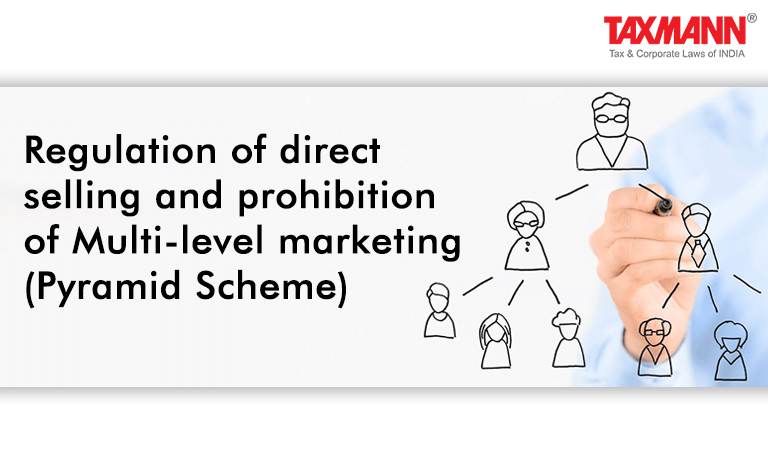Regulation of direct selling and prohibition of Multi-level marketing (Pyramid Scheme)
- Blog|News|Company Law|
- 2 Min Read
- By Taxmann
- |
- Last Updated on 6 January, 2022

[2022] 134 taxmann.com 12 (Article)
Normally, goods are sold through shops i.e. retail locations. However, in some cases, the goods are sold directly through direct sellers on the door to door basis and through word of mouth publicity. Often high-pressure sales tactics are used and unfair practices are followed. Ordinary Products or services are sold at unusually high prices, which are otherwise either worthless or available at much lower prices.
So far, there was no provision to regulate such sales. For the first time, provisions are made in Consumer Protection Act to protect consumers from such unfair practices.
Power to control direct selling under Consumer Protection Act – For the purposes of preventing unfair trade practices in e-commerce, direct selling and also to protect the interest and rights of consumers, the Central Government may take such measures in the manner as may be prescribed – Section 94 of Consumer Protection Act, 2019.
Though the section was notified and made effective on 24-7-2020, the relevant rules have been notified only on 28-12-2021.
Applicability of provisions relating to direct selling – As per Rule 2(1) of Consumer Protection (Direct Selling) Rules, 2021, save as otherwise expressly provided, these rules shall apply to––
(a) all goods and services bought or sold through direct selling
(b) all models of direct selling
(c) all direct selling entities offering goods and services to consumers in India
(d) all forms of unfair trade practices across all models of direct selling.
Transitory provisions for existing entities – existing direct selling entities shall comply with the provisions of these rules within ninety days from the date of publication of these rules in the Official Gazette – proviso to Rule 2(1) of Consumer Protection (Direct Selling) Rules, 2021.
Applicability of rules to entities established out of India – Notwithstanding anything contained in rule 2(1) of Consumer Protection (Direct Selling) Rules, 2021, these rules shall also apply to a direct selling entity that is not established in India but offers goods or services to consumers in India.
1-1 What is a direct selling
“Direct selling” means marketing, distribution and sale of goods or provision of services through a network of sellers, other than through a permanent retail location – Section 2(13) of Consumer Protection Act, 2019.
1-2 Direct seller
“Direct seller” means a person authorized by a direct selling entity through a legally enforceable written contract to undertake direct selling business on principal to principal basis- Rule 3(1)(c) of Consumer Protection (Direct Selling) Rules, 2021.
Click Here To Read The Complete Article
Disclaimer: The content/information published on the website is only for general information of the user and shall not be construed as legal advice. While the Taxmann has exercised reasonable efforts to ensure the veracity of information/content published, Taxmann shall be under no liability in any manner whatsoever for incorrect information, if any.

Taxmann Publications has a dedicated in-house Research & Editorial Team. This team consists of a team of Chartered Accountants, Company Secretaries, and Lawyers. This team works under the guidance and supervision of editor-in-chief Mr Rakesh Bhargava.
The Research and Editorial Team is responsible for developing reliable and accurate content for the readers. The team follows the six-sigma approach to achieve the benchmark of zero error in its publications and research platforms. The team ensures that the following publication guidelines are thoroughly followed while developing the content:
- The statutory material is obtained only from the authorized and reliable sources
- All the latest developments in the judicial and legislative fields are covered
- Prepare the analytical write-ups on current, controversial, and important issues to help the readers to understand the concept and its implications
- Every content published by Taxmann is complete, accurate and lucid
- All evidence-based statements are supported with proper reference to Section, Circular No., Notification No. or citations
- The golden rules of grammar, style and consistency are thoroughly followed
- Font and size that’s easy to read and remain consistent across all imprint and digital publications are applied



 CA | CS | CMA
CA | CS | CMA
